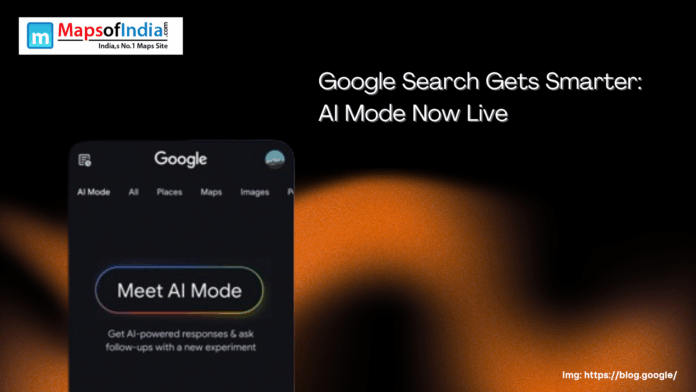Google Search is evolving. From the inclination of Google Images, from Jelo to having an AI copilot in today’s searches, Google has undergone drastic changes. The innovation of AI Mode has changed how users find information. Powered by Gemini 2.5, now Google search engine delivers smarter and conversational responses. It now handles complex searches with ease. Now, Google, with the necessary websites, gives us the necessary AI search for that thing. AI Mode has redefined the search experience. But it sparks debates about accuracy and web traffic.
What Is AI Mode?
AI Mode is Google’s advanced search interface, which has recently been included in the search engine. It was launched in the U.S. in May 2025, and it has been rapidly expanding globally. This search mode uses a custom Gemini 2.5 model. It’s different from normal searches. It works on nuanced answering multi-part questions. It works based on a “query fan-out” technique. In this technique, it breaks the asked queries into subtopics and runs multiple searches at the same time. The results we get after this are comprehensive. The result is also linked with links to web sources. Users can ask follow-ups to explore that topic more deeply. This AI Mode supports text, voice, and image inputs. This new addition aims to simplify complex searches. It’s a chatbot-like experience built into Search. But it’s experimental. Google has admitted to occasional errors. But as we know, feedback leads to improvements.
Key Features and Capabilities
With AI Mode, we have been introduced to a powerful tool. Deep Search is a standout of this new addition. It conducts hundreds of searches to give an expert-level result with cited reports. This addition saves hours of research. Search Live, inspired by Project Astra, enables answering real-time visual queries. Now it has made this simple, like pointing a camera at an object and asking questions, and within seconds, you will get the desired information. Users can multitask while searching. AI Mode is also used as your personal agent. It can book tickets or make reservations. The option of Personalization is also available. Users can connect Gmail for tailored results. If users are concerned about privacy, they can opt out whenever they want.
Applications in Everyday Use
The inclination of AI Mode has changed how we handle daily tasks. This mode is ideal for research-heavy searches. Students can explore complex topics like quantum physics with ease. Shoppers benefit from product comparisons. Those who like to travel can use it for planning. Multimodal inputs make it versatile. Upload a photo, and ask anything related to it. This new mode will answer it. Voice searches help when you are busy, you just need to give commands. Agentic features streamline actions. If you have given your information beforehand, AI Mode can pre-fill forms for bookings. In one year, over 1.5 billion users have engaged with AI-driven Search features and are continuously using them. It’s fast and intuitive. But sometimes an error occurs. It can hallucinate sometimes, giving us incorrect results.
Impact on Publishers and Web Traffic
AI Mode has reshaped how we perceive the digital landscape. Publishers are worried about reduced traffic. AI Overviews have already cut clicks by 30%. The new style of AI Mode responding in detail may keep users on Google longer. Publishers like HouseFresh have reported that there are fewer clicks despite more impressions. This new change is threatening to use ad-based revenue models. Google counters this claim, saying that AI Mode is having more and higher-quality traffic. Engaged users who click are more likely to convert. But critics argue that AI summaries replace sources. Users are satisfied with the summary content, only not going on the website to look for it. Google insists links remain central. Publishers must adapt with SEO-friendly, unique content.
Challenges and Future Directions
AI Mode is revolutionary, but it’s not flawless. Accuracy is a major concern in this mode. There are many instances when these searches have given wrong information. In AI terms, it is said that Hallucinations are AI-generated falsehoods. Google advises checking sources before considering an AI result. Privacy is another problem that arises from using AI. Personalisation using Gmail data is raising concerns. Technical issues, which are like untraceable Search Console data, are frustrating marketers. The updates coming in future will try to address this issue. In the future, Google has planned to enhance visuals with graphs and videos. Camera-based searches are expanding. As AI Mode is evolving, the feedback taken from users is shaping its future path.
Why AI Mode Matters
AI Mode has redefined how we look for information online. It has moved beyond typing on keywords to conversational intelligence. Users ask longer and complex queries, and the AI-powered search mode can distinguish and answer those difficult questions. With this new inclination, Google has noted a 10% rise in Search usage. Multimodality makes it accessible. The use of Voice, text, and images for search is helpful to cater to diverse users. Agentic tools save time on tasks like booking. But the shift toward AI search mode poses challenges to the open web. Publishers are looking toward an uncertain future. Users gain efficiency but risk filter MMA filter bubbles. Google sees AI Mode as progress. Balancing innovation and fairness is key to including this newfound technology in use.
Brands are using this AI mode more efficiently than anyone else. They are creating content that answers complex queries. Detailed guides and comparison articles are shown with Deep Search. Unique and high-value content stands out. AI mode is used to engage creativity. Users are asking more creative questions. For the information users who need to visit multiple websites, all this information is now available in one answer.
Conclusion
AI Mode has started a new era for Google Search. This mode was launched in 2025. Through this mode, users get smarter and multimodal answers. Functions in AI mode, like Deep Search, Search Live, and agentic tools, are enhancing functionality. Users benefit from this new, faster, and deeper response. There are some challenges that publishers face when traffic declines. Accuracy and privacy issues are still there. These results can be hallucinated. Google is making this mode better by using user feedback. In the future, updates we can expect include richer visuals and global expansion. AI Mode balances efficiency with challenges. It empowers users but disrupts traditional web models. The future of search is conversational.




